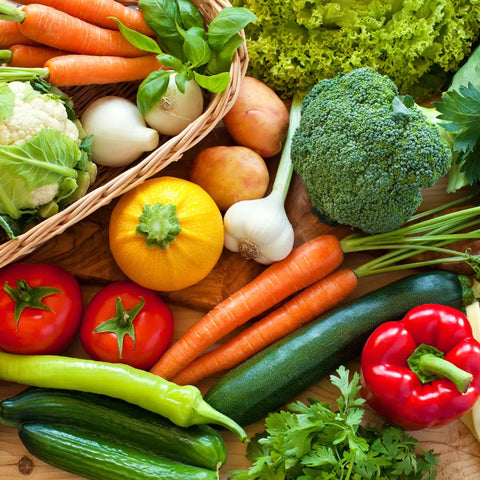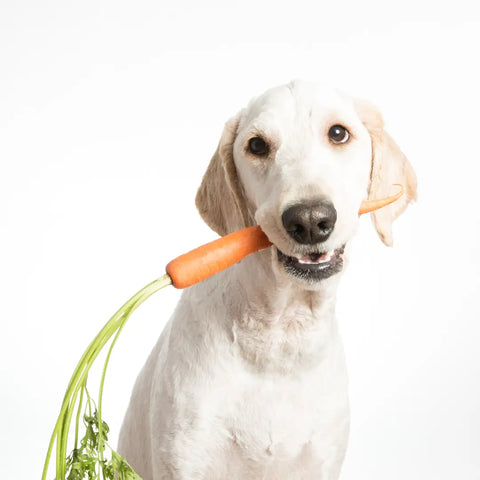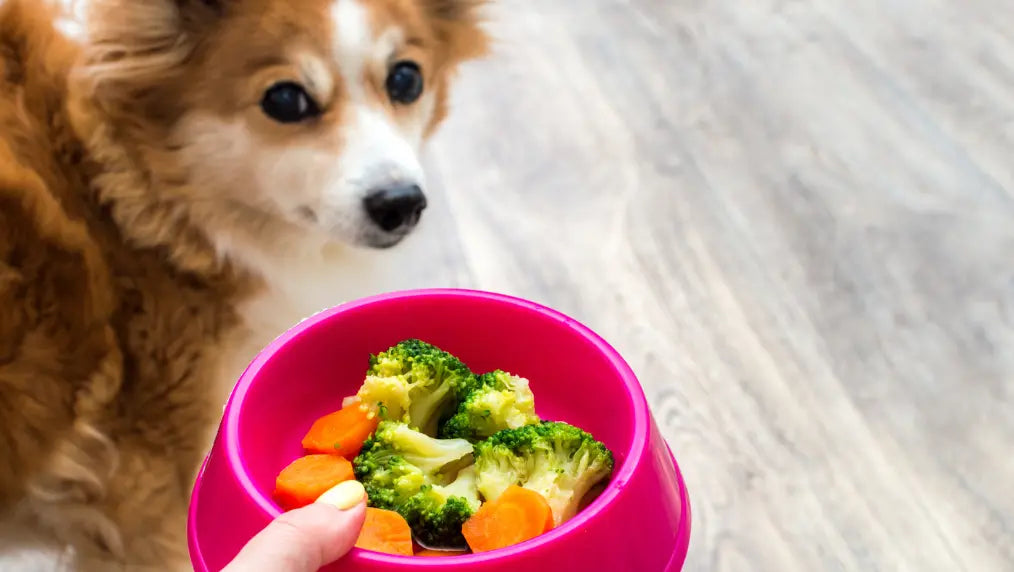Dogs, just like their wolf ancestors, need protein-heavy diets. Over centuries of domestication and life with humans, canines have grown to love certain vegetables, too. This doesn’t mean plopping a salad down in front of Luna and calling it a day! It means thoughtfully considering what your dog needs and supplementing their current, well-balanced diet with healthy veggies (or fruits). If you’re looking for healthy treats to add to your dog’s diet, try vegetables! Not only are vegetables a good source of vitamins and minerals that provide health benefits, but non-starchy dog-friendly vegetables are also low in calories and fat. They're great for a dog's immune system too! Wondering what vegetables can dogs eat? Well, listen up!
Vegetables are not only a tasty treat, but can help your canine companion with their digestive health. For instance, the fiber in pumpkin can help dogs with diarrhea or an upset stomach better digest their food and carrots, which are low in calories and high in vitamins, can be a delicious alternative to preservative-riddled dog treats. Of course, some vegetables may cause more harm than good in dogs prone to diabetes or kidney issues, which is why you’ve got to do your research before tossing new foods at your pup. As long as you stick to our list of vegetables dogs can eat (and avoid the vegetables known to be toxic to canines), your dog will be a happy pet with a well-rounded diet.
Note: ALWAYS talk to your vet before changing your dog’s diet or adding any of the vegetables below. You’ll also want to find out the best way to prepare these veggies for your dog’s specific needs and to avoid choking hazards.
Why Feed Vegetables to Your Dog?

It is safe to feed most dogs vegetables as long as you ensure their diet is between 40- and 70-percent protein. Protein could be plant-based (like legumes), but more often than not, muscle meats, organ meats and eggs are ideal forms of protein. Extra vegetables shouldn’t make up more than 10 percent of a dog’s diet. But that 10 percent can add significant nutrients proteins can’t offer. Of course, how much of your dog’s diet comes from vegetables will vary based on your pup’s activity level, age, breed, health issues and veterinarian recommendation. For instance, a vet may recommend switching out standard dog treats for carrots and apples if your dog needs to maintain a healthier weight.
Studies have found green leafy vegetables may reduce the risk of cancers in some dogs. So, if you own a breed predisposed to cancer, like a Golden retriever, adding these veggies to your dog’s diet in the form of snacks during long walks or mixed in with their favorite kibble is a good idea. Vegetables are a great source of hydration because of their high water content. They can also provide your dog with an assortment of vitamins, minerals, antioxidants, fiber, and phytonutrients, which are natural compounds found in plants that have disease-fighting potential. While meat makes up the majority of their diet, domestic dogs can also derive nutrients from grains, fruits, and vegetables.
As with any healthy diet, your dog should be consuming a variety of foods to maintain well-balanced nutrition. Strange behaviors like eating grass or their own poop could indicate some key elements are missing from your pet's diet.
Also Read: Why Do Dogs Eat Grass?
Finally, do not apply human guidelines to your canine pals! While humans indulge in spices and seasonings, many herbs can irritate your dog’s stomach. Paprika, allspice, bay leaves and garlic are just a few spices toxic to dogs. If your dog does ingest any of these, please contact your veterinarian immediately. And while you can live on a grain-free diet, dogs need healthy grains. In fact, grain-free diets are not good for dogs.
Going Grain Free
The FDA is investigating potential links between canine heart disease and diet — specifically grain-free dog food diets. The foods of concern are those containing legumes such as peas or lentils, other legume seeds, or potatoes listed as primary ingredients. The FDA began investigating this matter after it received reports of DCM in dogs that had been eating these diets for a period of months to years. DCM itself is not considered rare in dogs, but these reports are unusual because the disease occurred in breeds of dogs not typically prone to the disease.
Some breeds, especially large and giant breeds, have a predisposition to DCM. These breeds include Doberman Pinschers, Great Danes, Newfoundlands, Irish Wolfhounds, and Saint Bernards. While DCM is less common in medium and small breeds, English and American Cocker Spaniels are also predisposed to this condition.
In the FDA’s July 2019 update on diet and canine heart disease, they examined labels of dog food products reported in DCM cases to determine whether the foods were “grain-free” (defined as no corn, soy, wheat, rice, barley or other grains), and whether the foods contained peas, lentils, chickpeas, beans, or potatoes (including sweet potatoes). Their report states that more than 90 percent of foods reported in DCM cases were grain-free, 93 percent of reported foods contained peas and/or lentils, and 42 percent contained potatoes/sweet potatoes.
Are you looking for some nutritious veggie treats you can give your pup at home? There are tons of vegetables that are both healthy and safe for your dog to eat. But not all veggies are created equal, and a few are actually toxic for dogs.
Vegetables That Are Safe For Dogs

1. Cucumbers
- Method: Raw, chopped
- Frequency: In moderation
The AKC says cucumbers, on the other hand, are ideal for dogs who need to hydrate or maintain a healthier weight. Cucumbers boost energy yet have a low caloric count. Dogs will get an infusion of vitamins B1, C and K when they eat cucumbers, not to mention potassium, copper, magnesium, and biotin.
2. Cabbage
- Method: Raw or cooked, chopped
- Frequency: In moderation
- Avoid if: You own a breed prone to bloat, like a Great Dane
Dogs can definitely eat cabbage, though it might cause a gassy reaction. It contains vitamins B1, B6, C and K, not to mention tons of phytonutrients. These are antioxidants that improve the overall health of dogs—and humans—who consume them. Red cabbage is also a safe choice for down owners looking to boost their pet’s fiber, manganese, copper and potassium levels. Dr. Jerry Klein at the American Kennel Club says moderation is key, especially in breeds who tend to bloat or dogs with sensitive digestive systems.
3. Beets
- Method: Raw or cooked, chopped
- Frequency: Occasional treat
- Avoid if: Your dog is prone to kidney stones, has osteoporosis or diabetes
Many root vegetables are great for healthy coats and digestion in canines. Beets add vitamin C, fiber, folate, manganese and potassium to a meal. They can also help your dog better absorb other nutrients. The AKC warns against beets as treats for dogs with diabetes, osteoporosis or kidney issues due to the vegetable’s natural nutrients and sugars. If you do have a diabetic dog, be sure to check out our list of what fruits dogs can eat before chopping up a banana for your pup.
4. Carrots
- Method: Raw or cooked, chopped
- Frequency: A few carrot slices for small breeds up to a handful for large breeds
- Avoid if: Your dog has diabetes, as carrots do contain natural sugar
A fan favorite! The ASPCA says carrots (raw carrots or cooked) are an ideal snack for dogs because they can be eaten raw, are low in calories and don’t create much gas (which dog owners know can be a problem, especially with some veggies). Carrots provide vitamins B, C, D, E and K, not to mention lots of fiber. Healthy vegetables for sure!
5. Celery
- Method: Raw or cooked, chopped
- Frequency: About a handful per day
- Avoid if: You dog has dental problems or is dehydrated
It feels like celery works overtime to bring good things to our dogs. Full of vitamins A, B and C, it goes above and beyond to freshen your dog’s breath. Vitamin A helps boost your dog’s vision. (Pro tip: Crunchy veggies help remove tartar from a dog’s teeth - though the fibers may get caught in between their chompers!) One drawback is that celery contains sodium and can cause more frequent urination in dogs. Dehydrated dogs shouldn’t be given celery.
6. Broccoli
- Method: Raw or cooked, chopped
- Frequency: In moderation
- Avoid if: Your dog has digestive or gas issues
Like cauliflower, broccoli can cause gas. This can be a smelly experience for you and an incredibly uncomfortable experience for your dog. That being said, broccoli delivers vitamins A, C, E and K, not to mention tons of fiber and almost no fat. Be sure to chop well, as the stalks can get lodged in your dog’s throat if they’re too big.
7. Cauliflower
- Method: Cooked/steamed
- Frequency: Small quantities
- Avoid if: You own a breed prone to bloat
Cauliflower is safe in small quantities. Like other cruciferous vegetables on our list, it can lead to uncomfortable gas, which means breeds prone to bloat should be monitored closely and given only small amounts. Best served lightly steamed, cauliflower provides vitamins B, C, and K, and omega-3 fatty acids—all great for the immune system.
8. Butternut Squash
- Method: Cooked, pureed
- Frequency: Small amounts
If your dog needs foods rich in vitamins A, B6 and C to improve her immune or cardiovascular systems, go for some butternut squash. It’s low in calories, high in nutrients (an ideal combo) and typically gentle on the tummy. Cooking butternut squash to give it a softer texture is ideal for feeding to dogs. You could even try it as a Kong filler if your dog loves it.
9. Green Beans
- Method: Chopped, steamed, raw, or canned (low sodium only)
- Frequency: In moderation
- Avoid if: Your dog needs to gain weight
Another crunchy veggie (when served raw)! Green beans are also safe to serve steamed or canned, as long as they are plain and unsalted. Join your dog in a green bean snack, because you could both benefit from vitamins A, C and K, folic acid and fiber. The AKC says green beans can be effective weight loss treats for obese dogs, which means any pup trying to gain weight should avoid this vegetable!
10. Peas
- Method: Cooked, frozen, raw, chopped (if in shell/pod)
- Frequency: In moderation
- Avoid if: Your dog has kidney issues
A few peas here and there will add a small dose of fiber and protein to your dog’s diet. Fresh or frozen peas are fine. These are essential if your dog cannot or will not eat meat products. The AKC says dogs with kidney issues should avoid peas due to the vegetable’s high uric acid content.
11. Pumpkin
- Method: Canned, pureed, steamed
- Frequency: In moderation
Canned pumpkin is often better to serve your dog than raw pumpkin, as it’s easier to digest. Be sure to buy the regular canned pumpkin, not pumpkin pie filling. Pumpkin has been known to help dogs dealing with constipation, and its beta-carotene can boost vision health. Pumpkin seeds are OK to feed to dogs, as long as they are not coated in oils, butter or salt. Similarly, sweet potatoes are also a wonderful addition to your dog's regular food.
12. Spinach
- Method: Cooked or raw
- Frequency: Occasional snack
- Avoid if: Your dog has kidney issues
Rich in iron and magnesium, spinach can be a terrific addition to a canine diet. Vitamins A, C and E also make this leafy green veggie a winner (plus, it can fight against cancer, cardiovascular disease and inflammation). The AKC does warn that too much could be harmful due to oxalic acid which can cause kidney damage if over consumed (small amounts are still totally safe).
Vegetables That Dogs Should Avoid
- Asparagus
- Corn on the Cob
- Garlic
- Leeks
- Mushrooms and Wild Mushrooms
- Onions
- Rhubarb
- Tomatoes
- Avocado
As a rule of thumb, always get the OK from your veterinarian before feeding your pet a new food. Even some otherwise good veggies for dogs might not be ideal for pets with certain underlying medical conditions or special dietary needs. Watch out for any adverse reactions, such as nausea or loose stools. Sometimes certain safe veggies for dogs, will cause gas in dogs, so don’t overdo the amount you give them.
Commercial Dog Foods and Pet Food
Many commercial dog foods are made with vegetables and fruits along with meat and grains. These products are also made to include all the nutrients a dog needs to be healthy. So even though your pooch doesn't really need extra vegetables and fruits in their daily diet, they won't hurt them, either.
Which Vegetables Cause Gas in Dogs?
Gas isn’t fun for anyone, and there are some veggies that will cause lots of gas (and stomach pain) in canines. You might not know exactly which vegetables cause painful gas for your dog until they try it, but the following are known for it:
- Cabbage
- Cauliflower
- Broccoli
- Brussel Sprouts
Introducing Vegetables Slowly

When adding new foods to your dog's diet, it is recommended to do so slowly. Raw vegetables, cooked vegetables, and even prepared vegetables are a great snack. A small amount might be a good place to start, while keeping an eye out for any adverse reactions like gas or diarrhea. While dogs love new food, it's best to start slow. Over time, you can increase the amount, and variety, until you find the optimum level for your dog's particular tastes and digestion. Be sure to serve bite-sized, easy-to-chew vegetable pieces to your dog. Otherwise, you could be inadvertently serving your dog a choking hazard.
The ASPCA warns against slathering vegetables in spices, oils, sauces or anything else you think will make it “taste better” to your dog. Humans might need seasoning to down a head of broccoli, but dogs do not. Even sauteeing veggies in butter or adding salt can ruin the nutritional value of a vegetable and even cause harm to your pup.
Conclusion
A healthy snack, vegetables should always be added to an already healthy, balanced dog diet. Yes, there are many veggies that offer minerals and vitamins that can help your canine pal stay healthier longer, but even the ones with the highest nutritional values should be given in moderation. And pet parents, always be sure to watch your dog closely the first time they try something new to make sure they are chewing, swallowing and processing it well.


